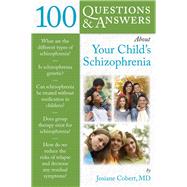
| Introduction | p. ix |
| The Basics | p. 1 |
| Questions 1-3 introduce the basics of childhood schizophrenia, including: | |
| What is "childhood schizophrenia" (also called child onset schizophrenia [COS])? | |
| What is the difference between thought disorder, psychosis (psychotic thinking), schizophrenic-like psychosis, and schizophrenia? | |
| Is my child insane? | |
| Signs & Symptoms: The Diagnosis | p. 13 |
| Questions 4-21 review common symptoms of schizophrenia and the diagnosis process, including: | |
| How is a thought disorder detected in a child? | |
| What are the different types of schizophrenia? | |
| What is the age of onset and how does it start? | |
| Causes of schizophrenia | p. 47 |
| Questions 22-33 discuss a number of possible genetic and environmental factors that cause schizophrenia, such as: | |
| Is schizophrenia in children due to psychological trauma, problems in the family, or bad parenting? | |
| Is schizophrenia genetic? Is it inherited? What are the genetics involved? | |
| What does it mean when doctors talk about chemical imbalance? | |
| Differential Diagnosis | p. 73 |
| Questions 34-40 talk about the differences between schizophrenia and other psychological disorders, such as: | |
| What is the difference between psychosis and schizophrenia? | |
| If you can have a psychotic process in mood disorders, how do you know the difference between a mood disorder and schizophrenia? | |
| My Child is schizophrenic and his doctor says that he became catatonic. What does that mean? | |
| Treatment of Schizophrenia: Medications | p. 83 |
| Questions 41-56 review the importance of seeking treatment with medications if your child is diagnosed with schizophrenia: | |
| What is the rationale for medications? Will it be the only treatment? | |
| Will my child respond differently from adults to the medication? | |
| What are the side effects of antipsychotic medications? | |
| Treatment of schizophrenia: Beyond Medications | p. 119 |
| Questions 57-61 discuss additional treatment options for patients with schizophrenia, including: | |
| What about electroconvulsive therapy (ECT)? Is there a role for this? | |
| What is cognitive behavioral therapy (CBT)? | |
| Is individual psychotherapy useful? | |
| Family, Friends, and the Community | p. 125 |
| Questions 62-67 describe ways to provide support to families and friends of the patient, such as: | |
| What is the role of family members and my child's friends in her treatment? What should we tell them? | |
| What do I tell other people? There is still a stigma. | |
| Should I try to get the rest of the family to help in the treatment of my child? | |
| Treatment centers, Hospitalization, and Residential Facilities | p. 133 |
| Questions 68-72 explain the different types of facilities and resources available for those suffering from schizophrenia, including: | |
| What about hospitalization? When is it needed and when is voluntary hospitalization worthwhile? Should it be short-term or long-term? | |
| What role do therapeutic residential facilities play? | |
| What about day treatment programs? | |
| Surviving | p. 139 |
| Questions 73-100 discuss common issues in dealing with the diagnosis, treatment, and prognosis of schizophrenia, such as: | |
| What if we cannot afford the medications? Are we stuck? Is there any way to get help? | |
| How do we reduce the risks of relapses and decrease any residual symptoms? | |
| What do we know about prognosis? | |
| Appendix | p. 179 |
| Glossary | p. 187 |
| Index | p. 197 |
| Table of Contents provided by Ingram. All Rights Reserved. |
The New copy of this book will include any supplemental materials advertised. Please check the title of the book to determine if it should include any access cards, study guides, lab manuals, CDs, etc.
The Used, Rental and eBook copies of this book are not guaranteed to include any supplemental materials. Typically, only the book itself is included. This is true even if the title states it includes any access cards, study guides, lab manuals, CDs, etc.